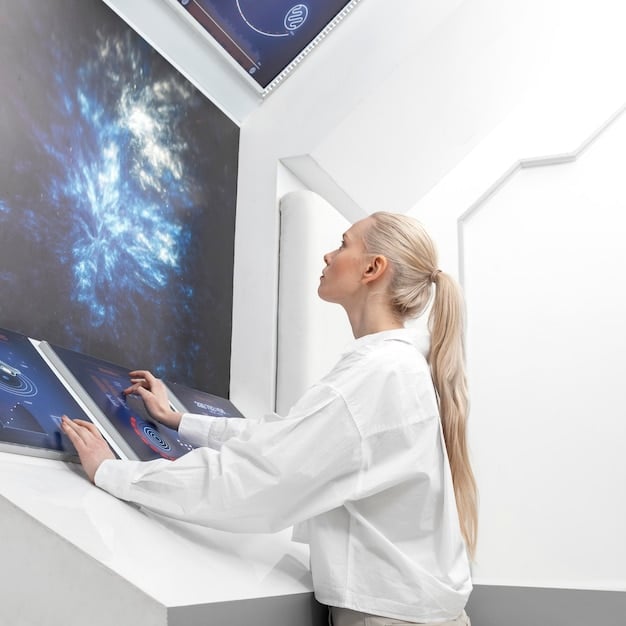AI-Powered Medical Devices: Revolutionizing US Healthcare

AI-powered medical devices are transforming healthcare in the US by enhancing diagnostics, personalizing treatment plans, and improving patient outcomes through advanced technologies like machine learning and predictive analytics.
The intersection of artificial intelligence and medical technology is rapidly reshaping healthcare in the United States. AI-powered medical devices: enhancing diagnostics and treatment in US hospitals and clinics, promise a future where healthcare is more precise, efficient, and patient-centric. How are these devices changing the landscape of medicine, and what impact will they have on patients and providers alike?
The Rise of AI in Medical Devices
Artificial intelligence’s integration into medical devices is not just a futuristic concept but a present-day reality. From diagnostic tools to therapeutic interventions, AI algorithms are enhancing the capabilities of medical technologies. These advancements are driven by the increasing availability of clinical data and the growing computational power to process this information effectively.
The potential of AI in healthcare extends beyond simple automation. AI-driven devices can analyze complex datasets, identify patterns undetectable by humans, and make predictions that inform clinical decision-making.
Key Areas of AI Application in Medical Devices
AI’s role in medical devices spans several critical areas, each with the potential to significantly improve healthcare outcomes:
- Diagnostics: AI algorithms are used to analyze medical images, such as X-rays and MRIs, to detect diseases earlier and more accurately.
- Treatment Planning: AI helps personalize treatment plans by analyzing patient data and predicting the most effective interventions.
- Monitoring: Wearable devices and remote monitoring systems powered by AI enable continuous patient monitoring and early detection of adverse events.
- Drug Discovery: AI accelerates the drug discovery process by identifying potential drug candidates and predicting their efficacy and safety.
These applications are poised to revolutionize healthcare delivery, making it more proactive, precise, and patient-centered.

In conclusion, the integration of AI into medical devices marks a significant advancement in healthcare. By enhancing diagnostics, personalizing treatment, and improving monitoring, AI is paving the way for a future where healthcare is more efficient, accurate, and tailored to individual patient needs.
Enhancing Diagnostics with AI
One of the most promising applications of AI in medical devices is in enhancing diagnostic capabilities. Traditional diagnostic methods often rely on human interpretation of medical images and data, which can be subjective and prone to errors. AI algorithms, on the other hand, can analyze vast amounts of data with high precision and consistency, leading to earlier and more accurate diagnoses.
AI’s ability to detect subtle patterns and anomalies in medical images makes it an invaluable tool for radiologists and other healthcare professionals.
AI-Powered Medical Imaging
AI-powered medical imaging tools are transforming the way diseases are detected and monitored. These tools use machine learning algorithms to analyze images from X-rays, CT scans, MRIs, and other imaging modalities, highlighting areas of concern and assisting radiologists in making accurate diagnoses.
- Improved Accuracy: AI algorithms can detect subtle anomalies that may be missed by human observers, reducing the risk of false negatives and false positives.
- Faster Diagnosis: AI can analyze medical images much faster than humans, enabling quicker diagnoses and treatment initiation.
- Reduced Workload: By automating routine image analysis tasks, AI can reduce the workload on radiologists, allowing them to focus on more complex cases.
AI-powered diagnostic tools are already making a significant impact in areas such as cancer screening, cardiovascular disease detection, and neurological disorder diagnosis.
In summary, AI is revolutionizing medical diagnostics by improving accuracy, speed, and efficiency. These advancements are leading to earlier and more accurate diagnoses, ultimately improving patient outcomes.
Personalized Treatment Plans Through AI
AI is enabling a shift towards more personalized treatment plans by analyzing individual patient data and predicting the most effective interventions. Traditional treatment approaches often follow a one-size-fits-all model, which may not be optimal for all patients.
AI algorithms can analyze a wide range of patient data, including genetic information, medical history, lifestyle factors, and treatment responses, to identify personalized treatment strategies.
Predictive Analytics for Treatment Optimization
Predictive analytics, powered by AI, is being used to optimize treatment plans by forecasting patient outcomes and identifying potential risks. These tools can help clinicians make more informed decisions about medication dosages, treatment schedules, and therapeutic interventions.
- Optimized Medication Management: AI can predict how patients will respond to different medications, helping clinicians select the most effective drugs and dosages.
- Personalized Therapy: AI can analyze patient data to identify personalized therapy approaches tailored to individual needs and preferences.
- Risk Stratification: AI can predict the risk of adverse events and complications, allowing clinicians to take proactive measures to prevent them.
AI-driven personalized treatment plans are showing promise in areas such as oncology, cardiology, and mental health, where individual patient characteristics play a significant role in treatment outcomes.

In conclusion, AI is transforming treatment planning by enabling personalized approaches that are tailored to individual patient needs. By analyzing patient data and predicting treatment responses, AI is helping clinicians make more informed decisions and optimize patient outcomes.
AI-Driven Drug Discovery and Development
The pharmaceutical industry is embracing AI to accelerate the drug discovery and development process, which traditionally is a lengthy and expensive endeavor. AI algorithms can analyze vast amounts of data, including genomic information, chemical structures, and clinical trial results, to identify potential drug candidates and predict their efficacy and safety.
Furthermore, AI can optimize clinical trial design, patient selection, and data analysis, leading to more efficient and successful drug development programs.
AI in Identifying Drug Candidates
AI algorithms can analyze vast databases of chemical compounds and biological targets to identify potential drug candidates with a higher likelihood of success. This can significantly reduce the time and cost associated with traditional drug screening methods.
Predicting Drug Efficacy and Safety
AI can predict the efficacy and safety of drug candidates by analyzing preclinical and clinical data. This helps researchers prioritize the most promising compounds for further development and avoid costly failures later in the drug development process.
AI is streamlining the drug discovery and development process by identifying promising drug candidates and predicting their efficacy and safety. These advancements are poised to accelerate the development of new therapies for a wide range of diseases.
Challenges and Ethical Considerations
While AI-powered medical devices hold great promise, their implementation is not without challenges. Data privacy, algorithmic bias, and regulatory hurdles are significant concerns that must be addressed to ensure the responsible and ethical use of AI in healthcare.
Addressing these challenges requires a collaborative effort involving healthcare providers, technology developers, policymakers, and patients.
Data Privacy and Security
The use of AI in medical devices requires access to vast amounts of patient data, raising concerns about data privacy and security. It is crucial to implement robust data protection measures and adhere to privacy regulations, such as HIPAA, to safeguard patient information.
Addressing Algorithmic Bias
AI algorithms can perpetuate and amplify biases present in the data they are trained on. This can lead to unequal or discriminatory outcomes. It is essential to carefully curate training data and develop algorithms that are fair and unbiased.
Regulatory and Legal Frameworks
The rapid advancement of AI in medical devices has outpaced the development of regulatory and legal frameworks. Clear guidelines and standards are needed to ensure the safety, efficacy, and reliability of AI-powered medical devices.
Successfully addressing these challenges will require a multi-faceted approach that involves collaboration, transparency, and a commitment to ethical principles.
Future Trends in AI-Powered Medical Devices
The field of AI-powered medical devices is constantly evolving, with new technologies and applications emerging at a rapid pace. Future trends include increased integration with wearable devices, advancements inExplainable AI (XAI), and expanded use in remote patient monitoring.
These advancements promise to further enhance the capabilities of AI-powered medical devices and improve healthcare outcomes for patients across the United States.
Integration with Wearable Devices
The integration of AI with wearable devices, such as smartwatches and fitness trackers, is enabling continuous patient monitoring and early detection of health issues. These devices can collect data on heart rate, sleep patterns, activity levels, and other vital signs, providing valuable insights into patient health.
Advancements in Explainable AI (XAI)
Explainable AI (XAI) is an emerging field that focuses on developing AI algorithms that are transparent and understandable to humans. XAI can help build trust in AI-powered medical devices by providing clinicians with clear explanations of how the algorithms arrive at their conclusions.
Remote Patient Monitoring
AI-powered remote patient monitoring systems are enabling healthcare providers to remotely monitor patients’ health conditions and intervene when necessary. These systems can improve access to care, reduce hospital readmissions, and lower healthcare costs.
| Key Point | Brief Description |
|---|---|
| 🩺 Enhanced Diagnostics | AI improves accuracy and speed in detecting diseases. |
| 💊 Personalized Treatment | AI analyzes patient data for tailored treatment plans. |
| 🧪 Drug Discovery | AI accelerates the process of identifying new drug candidates. |
| 🔒 Ethical Considerations | Addressing data privacy and algorithmic bias is crucial. |
Frequently Asked Questions
▼
AI-powered medical devices use artificial intelligence to enhance their functionality. They help interpret medical images, assist in diagnosis, and personalize treatment plans based on patient data.
▼
AI improves medical diagnostics by quickly analyzing large datasets of medical images. This can detect anomalies and subtle patterns often missed by human analysis, leading to quicker and more accurate diagnoses.
▼
Ethical concerns include data privacy, algorithmic bias, and the potential for unequal access to AI-driven healthcare. Addressing these issues is essential to ensure responsible AI use.
▼
AI analyzes patient data (genetic information, medical history, lifestyle) to predict treatment responses and optimize therapies. This customization results in more effective, tailored care.
▼
Future trends include greater integration with wearable devices, the development of explainable AI (XAI), and expanded remote patient monitoring, improving healthcare accessibility and outcomes.
Conclusion
AI-powered medical devices are revolutionizing healthcare in the US by enhancing diagnostics, personalizing treatments, and creating new opportunities in drug discovery. While challenges such as data privacy and ethical considerations must be addressed, the future of AI in healthcare is promising, with ongoing advancements poised to transform patient care.





